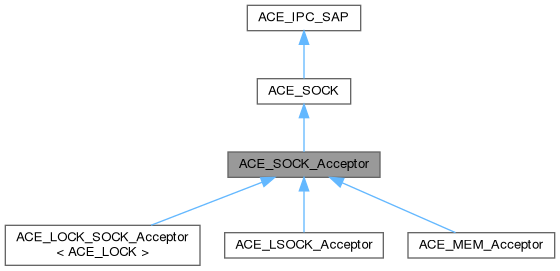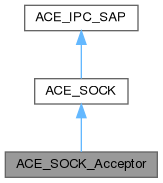Defines a factory that creates new ACE_Streams passively. More...
#include <SOCK_Acceptor.h>


Public Types | |
| typedef ACE_INET_Addr | PEER_ADDR |
| typedef ACE_SOCK_Stream | PEER_STREAM |
Public Attributes | |
| ACE_ALLOC_HOOK_DECLARE | |
| Declare the dynamic allocation hooks. | |
 Public Attributes inherited from ACE_SOCK Public Attributes inherited from ACE_SOCK | |
| ACE_ALLOC_HOOK_DECLARE | |
| Declare the dynamic allocation hooks. | |
 Public Attributes inherited from ACE_IPC_SAP Public Attributes inherited from ACE_IPC_SAP | |
| ACE_ALLOC_HOOK_DECLARE | |
| Declare the dynamic allocation hooks. | |
Protected Member Functions | |
| int | shared_accept_start (ACE_Time_Value *timeout, bool restart, int &in_blocking_mode) const |
| int | shared_accept_finish (ACE_SOCK_Stream new_stream, int in_blocking_mode, bool reset_new_handle) const |
| int | shared_open (const ACE_Addr &local_sap, int protocol_family, int backlog, int ipv6_only) |
 Protected Member Functions inherited from ACE_SOCK Protected Member Functions inherited from ACE_SOCK | |
| ACE_SOCK (int type, int protocol_family, int protocol=0, int reuse_addr=0) | |
| ACE_SOCK (int type, int protocol_family, int protocol, ACE_Protocol_Info *protocolinfo, ACE_SOCK_GROUP g, u_long flags, int reuse_addr) | |
| ACE_SOCK () | |
| ~ACE_SOCK ()=default | |
| Protected destructor. | |
 Protected Member Functions inherited from ACE_IPC_SAP Protected Member Functions inherited from ACE_IPC_SAP | |
| ACE_IPC_SAP () | |
| Default constructor. | |
| ~ACE_IPC_SAP () | |
| Protected destructor. | |
Private Member Functions | |
| int | get_remote_addr (ACE_Addr &) const |
| Do not allow this function to percolate up to this interface... | |
Detailed Description
Defines a factory that creates new ACE_Streams passively.
The ACE_SOCK_Acceptor has its own "passive-mode" socket. This serves as a factory to create so-called "data-mode" sockets, which are what the ACE_SOCK_Stream encapsulates. Therefore, by inheriting from ACE_SOCK, ACE_SOCK_Acceptor gets its very own socket.
Member Typedef Documentation
◆ PEER_ADDR
◆ PEER_STREAM
Constructor & Destructor Documentation
◆ ACE_SOCK_Acceptor() [1/3]
| ACE_SOCK_Acceptor::ACE_SOCK_Acceptor | ( | ) |
Default constructor.
◆ ACE_SOCK_Acceptor() [2/3]
| ACE_SOCK_Acceptor::ACE_SOCK_Acceptor | ( | const ACE_Addr & | local_sap, |
| int | reuse_addr = 0, | ||
| int | protocol_family = PF_UNSPEC, | ||
| int | backlog = ACE_DEFAULT_BACKLOG, | ||
| int | protocol = 0, | ||
| int | ipv6_only = 0 ) |
Initialize a passive-mode BSD-style acceptor socket (no QoS). local_sap is the address that we're going to listen for connections on. If reuse_addr is 1 then we'll use the SO_REUSEADDR to reuse this address. ipv6_only is used when opening a IPv6 acceptor. If non-zero, the socket will only accept connections from IPv6 peers. If zero the socket will accept both IPv4 and v6 if it is able to.
◆ ACE_SOCK_Acceptor() [3/3]
| ACE_SOCK_Acceptor::ACE_SOCK_Acceptor | ( | const ACE_Addr & | local_sap, |
| ACE_Protocol_Info * | protocolinfo, | ||
| ACE_SOCK_GROUP | g, | ||
| u_long | flags, | ||
| int | reuse_addr, | ||
| int | protocol_family = PF_UNSPEC, | ||
| int | backlog = ACE_DEFAULT_BACKLOG, | ||
| int | protocol = 0, | ||
| int | ipv6_only = 0 ) |
Initialize a passive-mode QoS-enabled acceptor socket.
◆ ~ACE_SOCK_Acceptor()
|
inline |
Default dtor.
Member Function Documentation
◆ accept() [1/2]
| int ACE_SOCK_Acceptor::accept | ( | ACE_SOCK_Stream & | new_stream, |
| ACE_Accept_QoS_Params | qos_params, | ||
| ACE_Addr * | remote_addr = 0, | ||
| ACE_Time_Value * | timeout = 0, | ||
| bool | restart = true, | ||
| bool | reset_new_handle = false ) const |
Accept a new ACE_SOCK_Stream connection using the QoS information in qos_params. A timeout of 0 means block forever, a timeout of {0, 0} means poll. restart == true means "restart if interrupted," i.e., if errno == EINTR. Note that new_stream inherits the "blocking mode" of this ACE_SOCK_Acceptor, i.e., if this acceptor factory is in non-blocking mode, the new_stream will be in non-blocking mode and vice versa.
◆ accept() [2/2]
| int ACE_SOCK_Acceptor::accept | ( | ACE_SOCK_Stream & | new_stream, |
| ACE_Addr * | remote_addr = 0, | ||
| ACE_Time_Value * | timeout = 0, | ||
| bool | restart = true, | ||
| bool | reset_new_handle = false ) const |
Accept a new ACE_SOCK_Stream connection. A timeout of 0 means block forever, a timeout of {0, 0} means poll. restart == true means "restart if interrupted," i.e., if errno == EINTR. Note that new_stream inherits the "blocking mode" of this ACE_SOCK_Acceptor, i.e., if this acceptor factory is in non-blocking mode, the new_stream will be in non-blocking mode and vice versa.
◆ close()
| int ACE_SOCK_Acceptor::close | ( | ) |
Close the socket. Returns 0 on success and -1 on failure.
◆ dump()
| void ACE_SOCK_Acceptor::dump | ( | ) | const |
Dump the state of an object.
◆ get_remote_addr()
Do not allow this function to percolate up to this interface...
◆ open() [1/2]
| int ACE_SOCK_Acceptor::open | ( | const ACE_Addr & | local_sap, |
| ACE_Protocol_Info * | protocolinfo, | ||
| ACE_SOCK_GROUP | g, | ||
| u_long | flags, | ||
| int | reuse_addr, | ||
| int | protocol_family = PF_UNSPEC, | ||
| int | backlog = ACE_DEFAULT_BACKLOG, | ||
| int | protocol = 0, | ||
| int | ipv6_only = 0 ) |
Initialize a passive-mode QoS-enabled acceptor socket. Returns 0 on success and -1 on failure.
◆ open() [2/2]
| int ACE_SOCK_Acceptor::open | ( | const ACE_Addr & | local_sap, |
| int | reuse_addr = 0, | ||
| int | protocol_family = PF_UNSPEC, | ||
| int | backlog = ACE_DEFAULT_BACKLOG, | ||
| int | protocol = 0, | ||
| int | ipv6_only = 0 ) |
Initialize a passive-mode BSD-style acceptor socket (no QoS). local_sap is the address that we're going to listen for connections on. If reuse_addr is 1 then we'll use the SO_REUSEADDR to reuse this address. ipv6_only is used when opening a IPv6 acceptor. If non-zero, the socket will only accept connections from IPv6 peers. If zero the socket will accept both IPv4 and v6 if it is able to.
- Return values
-
Returns 0 on success and -1 on failure.
◆ shared_accept_finish()
|
protected |
Perform operations that must occur after <ACE_OS::accept> is called.
◆ shared_accept_start()
|
protected |
Perform operations that must occur before <ACE_OS::accept> is called.
◆ shared_open()
|
protected |
This method factors out the common <open> code and is called by both the QoS-enabled <open> method and the BSD-style <open> method.
Member Data Documentation
◆ ACE_ALLOC_HOOK_DECLARE
| ACE_SOCK_Acceptor::ACE_ALLOC_HOOK_DECLARE |
Declare the dynamic allocation hooks.
The documentation for this class was generated from the following files: